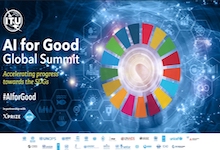Storytellers
17 May 2018 02:00h
Event report
Mr Frederic Werner (Senior Communications and Membership Officer, International Telecommunication Union (ITU)) moderated this session. He highlighted some key areas of focus for the discussion: connecting those with a good understanding of the situation on the ground with artificial intelligence (AI) experts, making AI relatable for people with a non-technical background, and working towards the sustainable development goals (SDGs) with AI.
Dr Aimee van Wynsberghe (Co-Founder and Co-Director of the Foundation for Responsible Robotics) focused on ethics as a driver for innovation and explained that ethics relate to ideas of what we consider the good life, and help us distinguish between right and wrong, and good and bad. She emphasised that taking ethical considerations into account when designing new technology and especially robotics, should not be seen as a hindrance, but rather as a way to push engineers and developers a step further.
Wynsberghe argued that we should not perceive technology as being neutral. On the contrary, she pointed out that technology is creating and co-creating our societal norms, values, and meaning. Technology could change the elements of what we think is constitutive of the good life. In fact, technology already shapes how we get to what we perceive as the good life, such us how information and communications technology (ICT) helps us bridge geographical distances and helps us connect with friends and family. Building on this, we see how robotics and AI can change our perception of what constitutes a ‘good life’ and how we can achieve it. Building on this, Wynsberghe suggested that ethical questions surrounding robotics and AI can be clustered into three main categories: regulations, users, and technology. Regulations touch on questions such as: What are the standards of training AI? How can we make robots that enhance rather than replace humans? Ethical considerations surrounding users include questions such as: How do users perceive robots? What could human-robot interactions do to human-human interactions?
How should users be obliged to act towards robots? And last but not least, a key ethical question relating to the technology itself is whether or not robots and AI are (ethical) agents in themselves.
Mr Maurizio Vecchione (Executive Vice-President of Global Good and Research, Intellectual Ventures) focused on the role of technology in saving humanity and argued that population-scale problems need to be put into sharper focus. In order to do so, he argued, various disciplines need to work together and solutions need to recognise the complexities on the ground. One specific example Vecchione gave to illustrate the vast potential of technology, relates to the so-called small holder innovation paradox. He argued that it is generally recognised that agriculture is a way out of poverty in low income countries. Yet, in many cases, the agricultural activities do not yield enough productivity. Here, better data combined with AI can produce analytics on soil and the environment and give predictions on crop yields and planning and advice. Similarly, it can contribute to much needed financial services. The data and services can easily be accessed via smart devices and can allow small holders to improve productivity and access new opportunities.
Dr Francesca Bria (Chief Technology and Digital Innovation Officer, Barcelona City Council) spoke about her work and gave concrete examples from the city of Barcelona. She emphasised data commons and ethical digital standards to solve urban challenges with clear rules and democratic control. She also stressed opportunities for collective action and citizens taking control and ownership. The role of the city is crucial for the future of AI for good. There are opportunities for the bottom up empowerment of citizens and re-thinking of technology to serve the city.
Bria stressed that in order for data and AI to serve the common good, we need to create trust and ownership. This means focusing on transparency regarding data and the algorithms used. This also includes offline and online consultations with citizens, and giving citizens control of their data. Data needs to be treated as a commons and a new legal regime of data ownership needs to be created. She suggested using blockhain technology and attribute-based cryptography in order to give control back to citizens and to allow them to decide what data is private and what data can be shared and become a common good. She thus advocated that citizens regain data sovereignty.
Related topics
Related event

